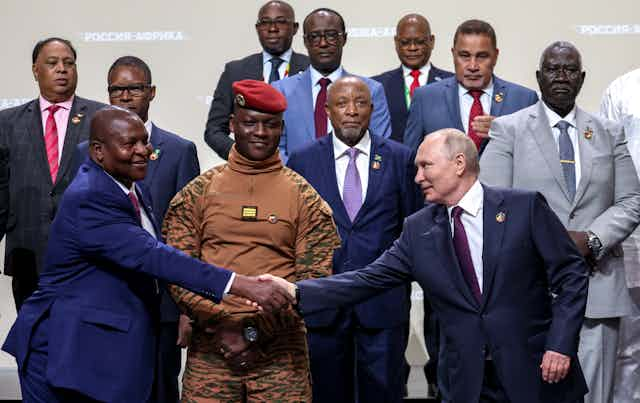The second Russia-Africa summit in St Petersburg on July 27 and 28 was predictably overshadowed by the war in Ukraine – and especially Russia’s refusal to agree an extension of the Black Sea grain deal, which expired earlier in the month.
Russia’s decision was widely condemned at the time – including by the Kenyan government, which called it “a stab in the back”.
Russia’s efforts to woo African leaders are part of the Kremlin’s broader efforts to extend its influence across the global south. The summit in St Petersburg, however, could not gloss over the limited success Russia has had in achieving this aim, nor the darker side of such efforts – including the weaponisation of food, and Russia’s support for some of the most repressive regimes in Africa.
At the summit, Moscow presented its attempts to extend its influence across the continent with seemingly eye-catching plans for investment in cultural and educational exchanges and economic diplomacy. This was evident in Vladimir Putin’s speech: Russia’s president praised – among other things – growing trade links, joint infrastructure and energy projects, and plans for Russian schools and universities to open branches in Africa.
But, even on paper, Russian accomplishments are far from impressive. According to the latest available UN statistics, trade with Africa amounts to around 2% of all Russian trade – putting Putin’s claim that Russia-Africa trade increased to US$18 billion in 2022 as a result of the first Russia-Africa summit in 2019 into a more sobering perspective.
Similarly, Russian energy projects have been notoriously difficult to implement. Among the most high-profile plans, an agreement was struck in 2015 for Russia to build a nuclear power plant in Egypt – but its construction only started in summer 2022, and the plant is not projected to reach full capacity until 2030.
Grain deal damage
Unsurprisingly, Putin also devoted considerable time in his speech to trying to justify Russia’s pull-out from the Black Sea grain deal. In its stead, he offered to replace Ukrainian grain shipments with Russian ones. This came in the form of a promise “to provide, free of charge, a supply of 25,000–50,000 tonnes of grain each to Burkina Faso, Zimbabwe, Mali, Somalia, the Central African Republic and Eritrea”.
This notably excludes Kenya and includes countries in which Russia already has an established presence. It has been described by the UN as completely insufficient as a replacement for the Black Sea grain deal. Under that deal, Ukraine was able to export some 33 million tons of grain and other foodstuffs, and it enabled the World Food Programme to ship 725,000 tons of wheat alone to Afghanistan, Ethiopia, Kenya, Somalia, Sudan and Yemen.

Even more cynically, Russia has tried to promote a trilateral plan with Turkey and Qatar to replace Ukrainian grain exports with its own. Given that prices have increased by almost 10% since Russia pulled out from the grain deal, declared civilian ships in the Black Sea as legitimate targets, and attacked Ukrainian port infrastructure, this makes perfect economic sense for Russia.
If this trend continues, it is likely to reverse the significant fall in global food prices of almost 25% since their peak in March 2022, which was achieved because of the grain deal that Russia has now spurned.
Kremlin influence-seeking in Africa
The Russia-Africa summit, with its supposed focus on economic and humanitarian cooperation, thus masks the darker reality of Russian influence-seeking in Africa. As evidenced in a recent report by the foreign affairs committee of the UK parliament, Yevgeny Prigozhin’s paramilitary Wagner group has been one of the Kremlin’s primary tools of projecting Russian influence in Africa. Prigozhin, whose group has propped up fragile authoritarian regimes across the continent and extracted valuable natural resource concessions in return, was reportedly sighted at the Russia-Africa summit shaking hands with various delegates.
The countries in which Wagner has had long-term involvement include the Central African Republic, Mali, Sudan, Libya, Zimbabwe and Burkina Faso. Four of these are now likely recipients of Putin’s “free grain” offer. Among them, Mali, the Central African Republic and Burkina Faso have all suffered from long-lasting instability, which further increased after they turned to the Wagner group to prop up their regimes.
Prigozhin’s apparent support for the recent coup in Niger and his offer to provide his mercenaries to restore order, therefore, do not bode well for the last even remotely stable western ally in the Sahel region.
Yet, the actual capacity of Russia to achieve lasting influence in Africa as a result of any or all of these efforts may in the end be rather more limited than the Kremlin might hope. After all, fewer than half of the countries attending the St Petersburg summit were represented at the level of their head of state or government –21 out of 49. This contrasts sharply with the first summit back in 2019, when 43 heads of state or government travelled to the summit.
This does not mean that Russian influence across Africa will not be a problem for the people whose countries are targeted by Russia. Its involvement – whether through official channels or through the Wagner group – will above all serve Russian interests, and then the interests of the regimes in power who rely on Russian support.
Contrary to the picture that the Russia-Africa summit seeks to paint, this is neither about economic development in Africa nor humanitarian support for its people. For Putin, this is nothing but a different front in what Russia perceives as its struggle against the west.
Bearing in mind the Soviet experience in Africa during the cold war, during which Moscow confronted the west in proxy conflicts including in Angola, South Africa, Mozambique and Zimbawe, this new gamble for influence is unlikely to pay off.

